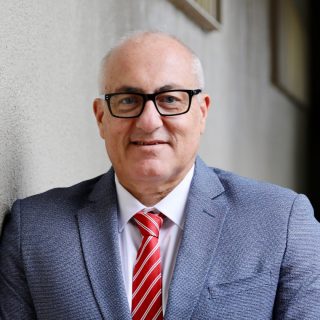Bowel cancer case
George was a 73-year-old man who had a history of diverticular disease (abnormality of the wall of the bowel). He was referred by his GP to a general surgeon/colorectal surgeon for a routine colonoscopy. During the colonoscopy a sample of a polyp/lesion was taken his large bowel and later confirmed on histology as cancer. Fortunately, there were no signs of the cancer having spread to any other organs.
The general surgeon recommended a surgery to remove part of the bowel with the cancerous tumour (distal transverse colon).
The surgery took place to resection part of the large bowel. The affected section with the tumour was removed and the two ends of the bowel sewn together with sutures (called an anastomosis). The surgery was performed by way of laparoscopy which is a non-invasive surgery and was recorded as being performed ‘without complication’ and George was returned to the ward.
Anastomotic Leak
A leak from the join between the two remaining ends of the large bowel is one of the most common and feared complications of intestinal surgery and is the single most common adverse event of such surgery. As such all surgeons should have foremost in their mind the potential for a leak to occur of intestinal fluids into the abdominal space (peritoneum). It is of vital importance the leak is diagnosed and treated urgently as it can lead to complications including infection, peritonitis, sepsis, multi organ failure and death.
Laparoscopic surgery also increases the risk of non-detection of anastomotic leak and should increase the index of suspicion.
Post operatively George developed abdominal pain and distention of the abdomen, purulent discharge from the drain, tachycardia (elevated heart rate), high temperature and decreased oxygen levels. Over the next seven days post operatively George developed pain, abdominal distention, tachycardia, nausea, respiratory symptoms through decreased oxygen saturations, cardiac instability, raised uraemia and creatinine levels suggestive of kidney failure, diminished urine output, hypotension (low blood pressure), heart failure and multi organ shutdown. The hospital was unable to control his pain. He began vomiting bile and all of his blood tests showed elevated white cell count and C-reactive protein, all suggestive of sepsis.
Instead of investigating and diagnosing the sepsis secondary to the anastomotic leak, the hospital sent George for an ECG, and a pulmonary angiogram suspecting a pulmonary embolus. They gave him a broad-based antibiotic, medication for constipation, inotropes for blood volumes to keep organs perfused, a diuretic for urine output and put him on bipap for respiratory/oxygen support.
It was not until day 6 that a CT of the abdomen was called for which showed a moderate volume of fluid in the peritoneum (abdominal space) and free gas, which should have suggested to the surgeon that there was an anastomotic leak and infection flowing from it.
Transfer to another hospital
Ultimately, the family lost faith in the hospital and the surgeon and requested an urgent transfer to another private hospital where the sepsis and peritonitis was diagnosed. There, they conducted an urgent laparotomy to resect the part of the failed bowel, a wash out and an ileostomy from the small bowel (diverting to a ileostomy bag). The infection was so bad that the surgical team could not close up and after the surgery George was sent to ICU for life support post-surgery.
George had renal failure and was on dialysis for nine weeks. He experienced severe wound break downs with infection, abdominal abscess and required multiple wash out operations and operations to treat abdominal adhesions as a result of the scar tissue around the surgical sites. He was in and out of hospital for the best part of eighteen months with admissions to ICU as his condition worsened from time to time.
George has been left with depression/post traumatic stress disorder, chronic pain, fatigue, organ dysfunction, sleep disorder, a decline in general conditioning and an inability to carry out activities of daily living. His life will never be the same again.
We acted for George in his claim against the hospital and were successful in settling his claim for a significant amount of money, which is now making life just a little easier for him and he is obtaining the care and assistance that he needs.
If you have been a victim or suffered loss as a result of medical negligence, call us today to speak to our friendly team.






 Lawyer
Lawyer